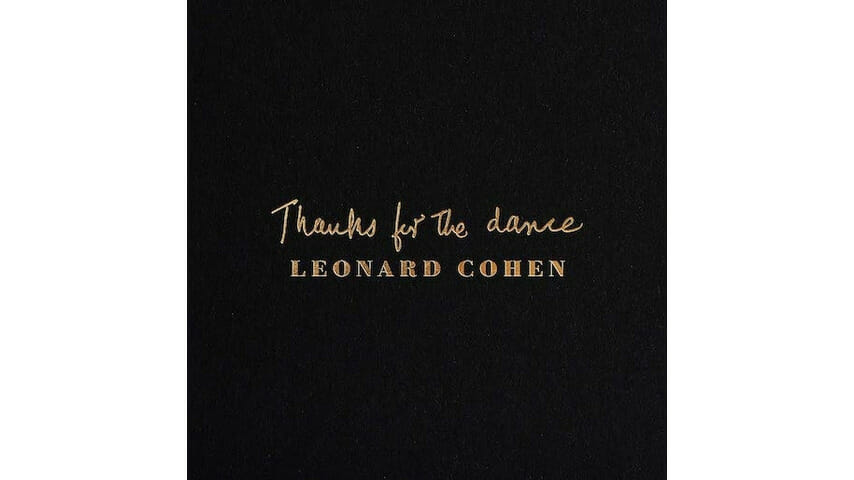No one writes songs about sex quite like Leonard Cohen did, which is to say, as an adult. It’s a surprisingly rare distinction, given that sex is such a common subtext in music, but Cohen wasn’t reveling in conquests, degrading his partners or exploiting power dynamics like some emotionally stunted ’80s hair-metal singer compensating for something. Though Cohen could behave like a cad in his real-life relationships, his songs about sex are generally chivalrous in an old-fashioned sense of the word: They’re courtly and mannered, attentive and solicitous, and if they are full of vivid descriptions, they’re rarely explicit.
“The Night of Santiago” is one such song. The centerpiece of Cohen’s new posthumous album Thanks for the Dance, the track is an ardent reminiscence of a long-ago liaison. Cohen describes a mutual seduction with affection, wonder and subtle wit. Some of his imagery is cringe-worthy—“her nipples rose like bread?”—but his rumbling whisper of a voice, and the charged interplay between simple piano chords and taut flourishes of flamenco guitar, more than compensates.
It wasn’t just sex: No one writes about a lot of things the way Cohen did, including spirituality and death. Those subjects also figure into Thanks for the Dance, though the album isn’t as grave and searching as the last few that Cohen released during his lifetime when he explored themes of mortality and asked pointed questions of God. At Cohen’s request, his son, Adam Cohen, assembled Thanks for the Dance from sketches his father had recorded, but didn’t use, for 2016’s You Want It Darker, which came out less than three weeks before Leonard Cohen’s death. Adam Cohen fleshed out the sketches into songs with help from frequent Leonard Cohen collaborators Jennifer Warnes, Sharon Robinson and Javier Mas as well as Adam Cohen’s own friends, including Beck, Daniel Lanois, Damien Rice, Leslie Feist, Bryce Dessner of The National and Richard Reed Perry of Arcade Fire.
Together, they show considerable restraint on understated, even elegant arrangements that serve Cohen’s lyrics. A guitar-like Spanish laud shapes the sound of opener “Happens to the Heart,” along with ghostly piano, acoustic guitar and, as the song progresses, muted strings conducted by David Campbell (Beck’s father) that float up slowly in the background, while Cohen ties love and religion, mortality and philosophy, into one tightly constructed package that serves as a summary of his well-lived life. Elsewhere, on “It’s Torn,” he juxtaposes visions of a woman’s presence with her eventual, and final, absence, sketching a bright memory even as it fades. Cohen intones the lyrics, low and solemn, while a deep, skeletal bassline, spare percussion and aching piano back him. It’s beautiful and sad, but with a hint of grace: “You gave me a lily and now it’s a field,” he sings.
“Puppets” is less redemptive as Cohen seems to question the notion of free will in a series of harrowing couplets that begin, “German puppets burned the Jews / Jewish puppets did not choose.” The accompaniment is mournful with a choir singing wordless backing vocals over a bed of synthesizers and piano. Though Cohen usually manages to land on a sliver of hope, there’s no resolution here—or maybe his supposition that we’re all puppets is the resolution, and we are meant to take comfort in the idea that we are but servants to a higher purpose, unfathomable though it may be to us. That notion has popped up before in Cohen’s music—see “Show Me the Place” from Old Ideas or “Born in Chains” on Popular Problems, among others.
As if to underscore that point, Adam Cohen closes the album with “Listen to the Hummingbird,” which, even more than usual for Leonard Cohen, is essentially a poem set to music. Dark, moody piano frames four simple stanzas as Cohen downplays his own words and voice in favor of what he regards as deeper truths. “Listen to the mind of G-d,” he sings (the spelling is a Jewish custom showing reverence). “Don’t listen to me.” It’s a moving sentiment, though it comes 52 years after Cohen released his first album in 1967—in other words, more than half a century since Cohen proved himself to be someone worth listening to. Thanks for the Dance, Cohen’s fifteenth and potentially final studio album, shows that little has changed in that regard. Whether he’s singing about sex or death, or whatever else, Cohen’s voice remains indispensable.
